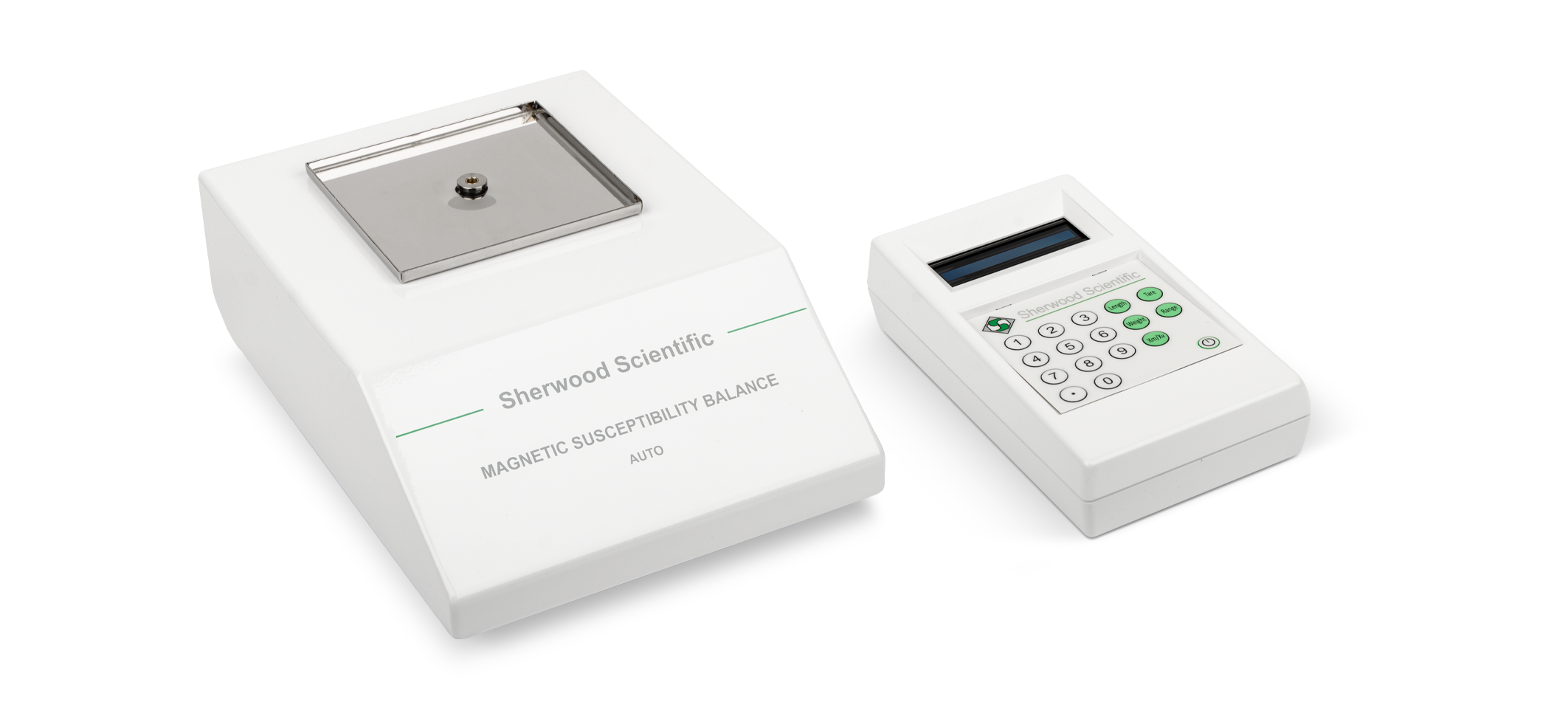
Product Overview
Magnetic Susceptibility is defined as:
“The ratio of the intensity of magnetism induced in a substance to the magnetising force or intensity of field to which it is subject.”
Basic Principles of Magnetic behaviour
Based on their magnetic properties, all substances can be classified into one of three groups, those attracted by a strong magnetic field, known as paramagnetic, those repelled, designated, and, finally, the most recognised class, ferromagnetic, unique in their ability to retain their own magnetic field. Ferromagnets are able to retain a permanent magnetic field since their free eletrons are in close proximity and remain aligned even after the external magnetic field is removed.
Unlike the ferromagnets, the magnetic properties of the diamagnetic or paramagnetic materials could only be observed and measured when these samples are held within a magnetic field; applied externally.
The Magnetic Susceptibility Balance – AUTO is a microprocessor controlled, state of the art, balance for detecting the magnetic properties of gases, liquids and solids. The improved sensitivity, versatility and overall performance make it ideally suited for new analytical applications in the research laboratory and industrial quality control.
Retaining all the advantages of our MK I instrument; the enhanced features of the Magnetic Susceptibility Balance AUTO are described:
TRUE PORTABILITY
This balance weighs just under 2.2 kg. and comes complete with rechargeable battery which allows up to 8 hours of operation away from a mains power supply. Supplied in its own robust carrying case the instrument can be fully operational in minutes after arrival at the analysis site. A travel clamp, external to the instrument and easy to apply, and an adjustable level control are the only setting-up procedures required.
EFFICIENCY AND SIMPLICITY THROUGH MICROPROCESSOR CONTROL
The 8751 microprocessor has the balance calibration constant entered during manufacture. The digital display of the measurement is directly converted to Volume susceptibility in c.g.s. units without need for calculation or manipulation. By entering the sample weight and length (internal sensors detect the diameter of sample tube) Mass susceptibility can be read directly from the display. The instrument automatically zeroes when the sample tube is not in position, so it is always ready for use. An auto tare facility can be implemented by simply pressing the Tare key with a blank tube in the sample position.
| Measurement ranges | Xv in 4 ranges from 0 to +/- 1.999 x 10-7, x 10-6, x 10-5, x 10-4 c.g.s. units |
| Sample volume required | 10ul to 200ul for accurate absolute measurements depending on tube size |
| Magnetic field strength | 4.5 kGauss |
| Analogue output | Voltage proportional to display value via BNC connector on detector unit back-panel. |
| Computer interface | RS – 232 via 9 – way female “D”- connector on detector unit back-panel |
| Detector unit | Control unit | Complete in Case | |
|---|---|---|---|
| Size(mm) | 40 H x 180 W x 235 D | 45 x 100 x 180 | 250 x 550 x 400 |
| Weight (kg) | 2.2 | 0.4 | 4.0 |
| Battery | 4 x AA cells – Rechargeable only. Full charge gives >8 hrs. operation. | ||
| External supply | t6 – 9 V d.c. (a.c. input adaptor, 110 V or 240 V, supplied also serves as battery charger) |
| Size in cm (unpacked) | 30 w x 24d x 4.5h |
| Size in cm (packed) | 55w x 40d x 26h |
| Weight (unpacked) | 2.2 Kg (~ 5 lbs) |
| Weight (packed) | 9 Kg (~ 20 lbs) |
| Measurement range | Approx. ±1.999 x10-4 to ±5×10-10 cgs |
| Amount of sample required for accurate determination of Magnetic Susceptibility | 10µl (min) 400µl (max) Approx. 0.04g solid (depending upon density) Approx. 0.025g in solution |
| Detection limits | Approx. 10x lower than above (depending upon Magnetic Susceptibility) |
| Outputs | Digital display RS232 Analogue output |
| Magnetic Field Strength | 4.5 kGauss |
The MSB Mk1 is supplied with a Universal Power Supply accepting input voltages over the range 100 – 240V AC, 50/60Hz, with output to the instrument of 12V DC.
Siting of the Balance
Before removing the Travel Clamp it is important to consider the siting of the balance. The balance is sensitive to external magnetic fields; many stray constant fields can be adjusted for, however stray variable fields such as those emitted from conventional magnetic susceptibility balances using an electromagnet, or an Electron Spin Resonance spectrometer cannot be adjusted for and will cause the balance readings to fluctuate.
Other sources of variable magnet fields include computers, mobile phones, as well as more benign-seeming moving metal objects such as doors opening and closing. If the balance is placed on a bench with drawers, ensure that ferromagnetic objects are not situated directly below.
If in doubt, once the balance it installed check whether the zero reading of the balance changes when the external magnetic field is varied. If the variation is too great, refit the Travel Clamp and try installing the balance in another location.
For best results, the balance should be placed on a level and stable surface free from vibration in an environment not subject to chemical fumes or rapid changes in temperature.
